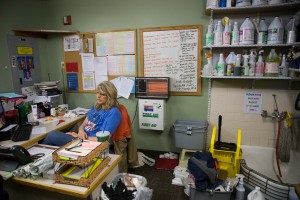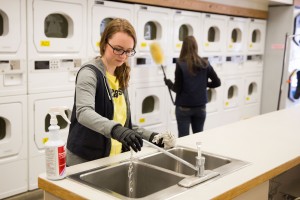
Blue collar and entry-level jobs might not be seen as the most glamorous work options to BYU students, but many are finding that janitorial and maintenance work provides skills and mindsets invaluable for future jobs.
Zach Andersen, a peer mentor with BYU’s University Career Services, said these jobs give students valuable material to put on resumes.
“It’s definitely a stepping stone to give you experience,” Andersen said.
Wyview Park custodial manager DeAnna O’Hara said custodial work is rarely a job students want to do, but it can teach students more than they think.
“You learn more than how to mop floors or how to clean toilets — though you do learn how to clean very well,” O’Hara said. “You learn skills to help you in your life.”
Working as a custodian was BYU student Amber Millington’s first job, and it taught her a lot.
“I had to be responsible, work on a team and pay attention to details,” Millington said. “You can’t skip over things. It takes a lot of honesty and integrity.”
According to an Amberdeen Group study, the lack of critical skills available in the labor pool accounts for 80 percent of the pressure on companies looking to hire. A similar study by the Society of Human Resources Management shows that these skills include critical thinking, problem solving, professionalism, leadership, communication and teamwork.

BYU student Janelle Clark said custodial work helps her develop many of these skills.
“There’s more to custodial than people think,” Clark said. “You have to be a good worker. You have to be on top of things, stay busy and carry out responsibilities as much as any other job.”
However, critical skills are not the only benefit that a blue-collar job can give to students. Andersen said students who work less-desirable jobs have a strong mentality.
“These are people who are motivated and who do what’s necessary now to be able to do what they want to do,” Andersen said. “They are willing to sacrifice now to accomplish what they want later in life.”
LDS Employment Resources supervisor Larry Stevenson said low-paying jobs help students change their perspectives toward life and working.
“That’s the advantage of working a job they don’t want to be in,” Stevenson said. “They learn that they are a student, but also something else. They learn to think ‘I won’t always be a student.'”
On-campus blue-collar work can help students develop valuable skills that can appeal to future employers.
“It’s not a glamorous job and not what people look for first,” Millington said. “But it’s a good job.”




